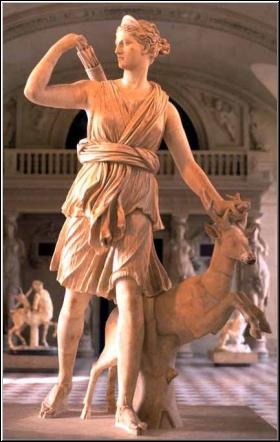 I sing of Artemis, whose shafts are
of gold, who cheers on the hounds, the pure maiden, shooter of stags, who
delights in archery, own sister to Apollo with the golden sword. Over the
shadowy hills and windy peaks she draws her golden bow, rejoicing in the
chase, and sends out grievous shafts. The tops of the high mountains tremble
and the tangled wood echoes awesomely with the outcry of beasts: earthquakes
and the sea also where fishes shoal. But the goddess with a bold heart
turns every way destroying the race of wild beasts: and when she is satisfied
and has cheered her heart, this huntress who delights in arrows slackens
her supple bow and goes to the great house of her dear brother Phoebus
Apollo, to the rich land of Delphi, there to order the lovely dance of
the Muses and Graces. There she hangs up her curved bow and her arrows,
and heads and leads the dances, gracefully arrayed, while all they utter
their heavenly voice, singing how neat-ankled Leto bare children supreme
among the immortals both in thought and in deed. [Image: Diana of Versailles;
Roman copy of a Hellenistic original.]
I sing of Artemis, whose shafts are
of gold, who cheers on the hounds, the pure maiden, shooter of stags, who
delights in archery, own sister to Apollo with the golden sword. Over the
shadowy hills and windy peaks she draws her golden bow, rejoicing in the
chase, and sends out grievous shafts. The tops of the high mountains tremble
and the tangled wood echoes awesomely with the outcry of beasts: earthquakes
and the sea also where fishes shoal. But the goddess with a bold heart
turns every way destroying the race of wild beasts: and when she is satisfied
and has cheered her heart, this huntress who delights in arrows slackens
her supple bow and goes to the great house of her dear brother Phoebus
Apollo, to the rich land of Delphi, there to order the lovely dance of
the Muses and Graces. There she hangs up her curved bow and her arrows,
and heads and leads the dances, gracefully arrayed, while all they utter
their heavenly voice, singing how neat-ankled Leto bare children supreme
among the immortals both in thought and in deed. [Image: Diana of Versailles;
Roman copy of a Hellenistic original.]
Homeric Hymn XXVII.Trans.
H.G. Evelyn-White.

Muse, sing of Artemis, sister of
the Far-shooter, the virgin who delights in arrows, who was fostered with
Apollo. She waters her horses from Meles deep in reeds, and swiftly drives
her all-golden chariot through Smyrna to vine-clad Claros where Apollo,
god of the silver bow, sits waiting for the far-shooting goddess who delights
in arrows.
[Image: Artemis as Mistress of
Beasts (Potnia Theron); from a Boeotian vase, c. 700 BC. Greek religion
assumed that a symbiotic relationship existed between hunter and hunted,
and Artemis is both a killer of wild animals and their protectress: "Thou
who art gracious to the tender cubs of lions, and all the suckling young
of roving beasts" -- Aeschylus, Agamemnon 134.]
Homeric Hymn IX.
Trans. H.G. Evelyn-White.
|


